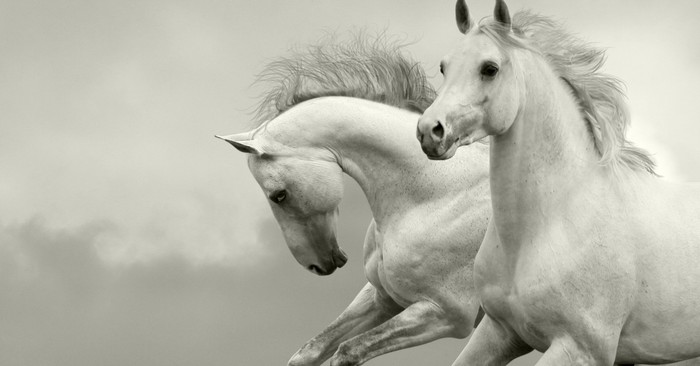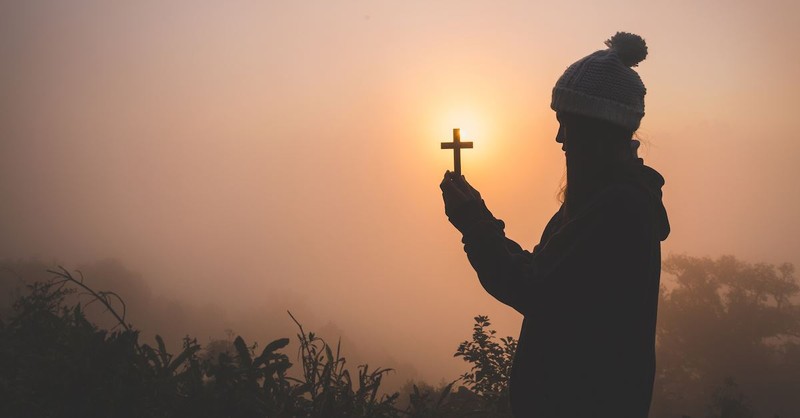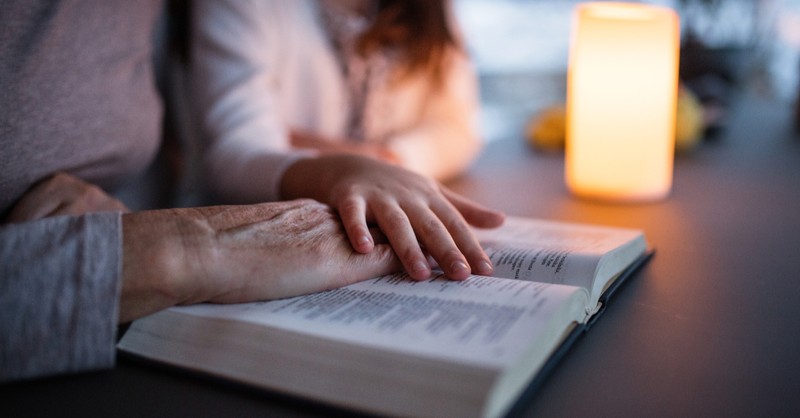
When people think of Native Americans, a whole slew of ideas, images, and impressions may come to mind.
But one perspective not frequently heard or shared is that of the Native American Christian. These believers are still members of their tribe and love their people, but they follow God rather than their culture’s traditional religion. They may participate in some of the Native customs but not others.
For Christians, our background, culture, and where we live determine the context in which we understand and live out our faith. Listening to the stories of those from different environments can help us understand biblical truths in a new and more tangible way.
There is much we can be taught from Native American Christians, including these ten lessons I learned from my grandma, a Navajo Christian Missionary:
Photo Credit: ©Getty Images/mari_art

1. God Speaks to People of Every Tribe, Nation, and Tongue.
Lillian Deshnod Litfin was born in 1934 to a Navajo woman of the Bitterwater Clan and a Navajo medicine man. She attended two government boarding schools, received training in the Bible and evangelism, and served as a translator and missionary at two Christian missions in New Mexico.
To me, she was Grandma, a beautiful, loving woman whose steady spirit shone with joy and peace. She had an incredibly strong connection to God’s Spirit that guided her in every moment. Growing up, I loved her brown skin which was darker than mine, and her soothing, accented voice. Without understanding the association I was making, I attached a sense of comfort, respect, and God’s love to everyone who spoke a different language and/or came from another country or culture.
I recently learned that when Grandma was young, her dad would take her up the sacred Navajo Mountain.
“When we get up there, you need to pray,” he told her.
“Who do I pray to?” she asked.
“You’ll know,” he said.
So, Lillian prayed to a God she didn’t know. Later, when she attended classes in Christianity at the boarding school, she recognized the God in the Bible as being the One to whom she’d unknowingly prayed. She gave her life to Christ and started serving Him with all her heart. “You will seek Me and find Me when you search for Me with all your heart” (Jeremiah 29:13, NASB).
The Bible shows us multiple examples of people from many nations responding to God. Revelation 7:9 proclaims, “After these things I looked, and behold, a great multitude which no one could count, from every nation and all tribes and peoples and tongues, standing before the throne and before the Lamb, clothed in white robes, and palm branches were in their hands.”
Photo Credit: ©GettyImages/rdonar

2. Nobody Can Prevent God’s Spirit from Being Heard by a Heart That Is Open to Hear Him
It’s no secret that people throughout history have done misguided and sometimes horrendous things in the name of God and Christianity. Paul, the greatest evangelist in the New Testament, began his journey by imprisoning and supporting the killing of Christians in the name of God (Acts 8-9).
Years later, after Paul started following Christ and sharing His love with Jews and Gentiles, the leaders of the Jewish Christians struggled to understand how God could allow Gentile Christians to worship Him without following the same cultural practices as they did (Acts 15).
But God is bigger than human sins, misunderstandings, and failures.
Grandma Lillian’s open heart heard and connected to God’s loving voice and presence in the midst of the strict boarding school environment. Her faith in Him was real and strong enough to survive the injustices she would see throughout her life.
Photo Credit: ©GettyImages/Tatiana

3. Love Everyone, Regardless of Differences
Grandma showed love to everyone, no matter their religious beliefs, culture, ethnicity, or how they treated her. Becoming a Christian didn’t lessen her love for her family or the Navajo people. In fact, it strengthened her heart for them.
Being forced to attend a boarding school where she couldn’t speak her first language or learn the Navajo culture didn’t prevent her from loving Caucasians, either.
Years later, when she worked with Caucasian missionaries, Grandma Lillian served them and the Navajo with equal fervency.
Throughout her life, Grandma interacted with those who discriminated against her with a peaceful dignity and respect. Nothing could make her love people less.
“Beloved, let us love one another, for love is from God; and everyone who loves is born of God and knows God” (1 John 4:7, NASB).
“But I say to you who hear, love your enemies, do good to those who hate you, bless those who curse you, pray for those who mistreat you” (Luke 6:27-28, NASB).
Photo Credit: ©GettyImages/Rawpixel

4. Don’t Let Difficult Circumstances or Conflicts Make You Bitter
It’s all too easy to fall into bitterness when life feels hard and people hurt us. Being a Christian doesn’t mean we don’t struggle, and it doesn’t make it easy to love those who bring pain.
While I don’t know if Grandma ever felt bitter, I do know that, in spite of her hardships, I never heard or sensed any bitterness or resentment from her. She never spoke an unkind word about anybody. This is an example I remember and strive to follow.
“Let all bitterness and wrath and anger and clamor and slander be put away from you, along with all malice. Be kind to one another, tender-hearted, forgiving each other, just as God in Christ also has forgiven you” (Ephesians 4:31-32, NASB).
Photo Credit: ©GettyImages/coffeekai

5. Be Willing to Be Uncomfortable
Lillian was forced to leave the comforts of her family and home before she’d even turned six years old. After finishing the grades offered at the Shiprock boarding school, she spent the first of her high school years at the Albuquerque Indian School. Her classes in Christianity were taught by Ray and Mary Martindale.
Shortly after she started high school, while still a young teenager, Lillian moved with the Martindales to Counselor, New Mexico, where they opened a mission to work among the Navajo. Her teachers embraced her as a member of their family, and she lived with them for two years while serving as their translator.
And then the fearless teenager journeyed even further. Leaving everything she knew (again), Lillian traveled to Anderson, Indiana to continue her training at the Great Commission School. A year later, she returned to Albuquerque to finish high school before rejoining the Martindales at a new mission they’d established in Torreon.
Grandma once told me that, because she spent so many years away from the Navajo community, she never felt like she quite fit in with them. Although she worked as a translator, she always felt like her Navajo-speaking skills were like those of a five-year-old.
However, she didn’t let those insecurities prevent her from loving and helping her people. Grandma is known and remembered for her commitment to visit people in their hogans (traditional Navajo houses). She introduced them to Christ and shared His love.
When I traveled to the reservation with my dad as a child, we’d visit some of those same Navajo people. The conversations usually included how much they remembered and appreciated my grandparents for helping and talking with them so many years ago.
Like my grandma, I’ve often traveled beyond my comfort zone. Unlike her, I’m still learning to let go of my fear that I won’t fit in or be accepted, especially among Native communities.
“Have I not commanded you? Be strong and courageous! Do not tremble or be dismayed, for the Lord your God is with you wherever you go” (Joshua 1:9, NASB).
Photo Credit: ©Julentto Photography on Unsplash

6. Trust God Rather Than Fearing People
Grandma Lillian followed the leading of God’s Holy Spirit regardless of what others thought, said, or did.
She held strong to her faith even when surrounded by those who followed the Native religions, and she didn’t cower in the face of threats that came against the Torreon Navajo Mission. In addition to facing opposition from some traditional Navajos who were antagonistic toward Christian missionaries, Grandma confronted her share of racism. She married a Caucasian preacher at a time when most states still had laws against interracial marriage, and in spite of Grandpa’s mother opposing their union.
One day, when Lillian was driving through Arizona with her youngest daughter, they stopped at a gas station and were approached by a Native man, threateningly waving a hatchet at them.
He edged closer to the daughter’s door, all the while asking, “Do you want to buy this hatchet?”
Without showing an ounce of fear, Grandma approached the man, put herself between him and her daughter, and held out her hand.
“Let me see it,” she said. “Give it to me and let me look at it so I can decide if I want to buy it.”
The man hesitated, held it out of her reach, and finally left.
Grandma knew and lived by the truth that, “Those who are with us are more than those who are with them” (2 Kings 6:16, NASB).
“If we live by the Spirit, let us also walk by the Spirit” (Galatians 5:25, NASB).
“The fear of man brings a snare, But he who trusts in the Lord will be exalted” (Proverbs 29:25).
Photo Credit: ©iStock/Getty Images Plus/natasaadzic

7. Find Joy and Contentment Wherever You Are
Grandma loved being among the Navajo on the Reservation and living in Oregon where she later moved with my grandpa and their children. One of her favorite places was the coast, but she also enjoyed visiting new places.
It always seemed to me that, no matter where we were or what we were doing, Grandma was happy and at peace. She rejoiced in seeing others find joy. I’d often see her sitting back with a big smile, watching everyone interact and have a good time.
“Not that I speak from want, for I have learned to be content in whatever circumstances I am. I know how to get along with humble means, and I also know how to live in prosperity; in any and every circumstance I have learned the secret of being filled and going hungry, both of having abundance and suffering need. I can do all things through Him who strengthens me” (Philippians 4:11-13)
Photo Credit: ©GettyImages/fizkes

8. Meet People Where They Are
One of my favorite things about Grandma was the way she’d speak to me as if I was the most important person in her world, as though I understood everything she was saying.
Grandma Lillian met people where they were, gave them her full attention, listened, and spoke in such a way that made them feel valued.
“Let your speech always be with grace, as though seasoned with salt, so that you will know how you should respond to each person” (Colossians 4:6).
Photo Credit: ©GettyImages/monkeybusinessimages

9. Pray Every Day for Those You Love
Grandma loved and prayed for her family every day.
Shortly before she died, my uncle asked her, "Who is going to pray every day for all of us when you go to heaven?"
She gave him a knowing look and replied, "Well, of course, you all are."
“With all prayer and petition pray at all times in the Spirit, and with this in view, be on the alert with all perseverance and petition for all the saints,” (Ephesians 6:18)
Photo Credit: ©Thinkstock/TinnakornJorruang

10. Remember Our Identity Begins with Christ, Everything Else Is Secondary
Grandma didn’t talk much about being Navajo. I certainly asked her lots of questions, but there were still times I wished she would tell me more about what she knew and had experienced of the culture. I wished I could have heard and learned more of the language.
It took me a long time to finally understand that for Grandma, her first identity was as a child of God. Everything else, including her Native heritage, was secondary. I don’t think she didn’t speak about Navajo culture because she didn’t like to: it just wasn’t foremost in her mind.
As Christians, our identity begins as children of God. Everything else--our gender, personality, heritage, culture, job, relationships, and anything else we use to describe or define ourselves--is the unique and special context through which we come to understand and live out our faith and identity in Christ.
“For you are all sons of God through faith in Christ Jesus. For all of you who were baptized into Christ have clothed yourselves with Christ. There is neither Jew nor Greek, there is neither slave nor free man, there is neither male nor female; for you are all one in Christ Jesus” (Galatians 3:26-28, NASB).
Photo Credit: ©Getty/Halfpoint
Originally published Monday, 04 September 2023.







